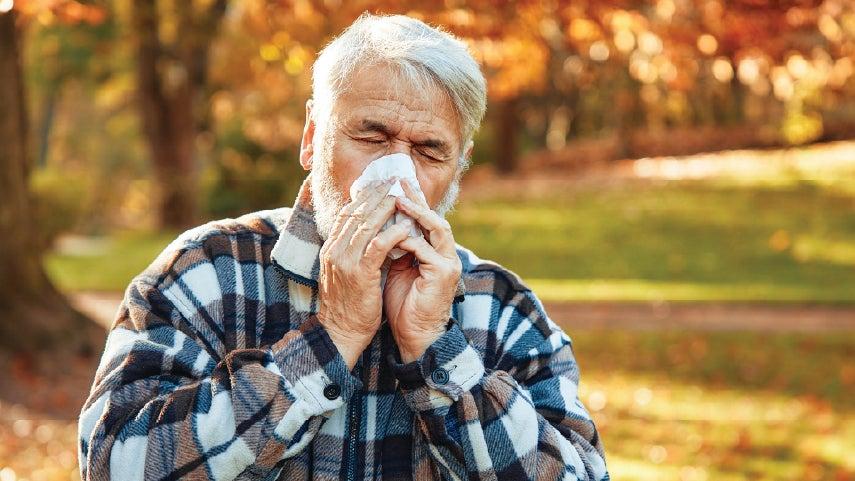
Related Topics
Do you stock up on tissues and cough drops at the first sign of a chill in the air? Are you bracing for that first telltale sniffle of the season?
As winter nears, getting sick might seem inevitable. However, while we can’t completely avoid seasonal germs, we can take steps to avoid a flu infection. This is especially important as we get older, when our immune system isn’t as robust as it used to be—and serious illness and complications from the flu are more likely. The Centers for Disease Control and Prevention (CDC) estimates 70-85% percent of seasonal flu-related deaths and 50-70% of seasonal flu-related hospitalizations have occurred in people age 65 and older.1
How can older adults prevent the flu?
Below are seven simple-yet-effective flu prevention tips tailored for older adults.
1. Get vaccinated
The best way to prevent the flu is to stay up to date with your flu vaccine. For the 2025-2026 flu season, CDC advises that “everyone 6 months and older, with rare exceptions, should get a flu vaccine every season.”
Getting vaccinated is especially critical for older adults. "People age 65 and older should opt for high-dose flu vaccines or adjuvanted flu vaccines, which are specifically designed to boost the immune response in older adults," said Dorothea Vafiadis, Senior Director of NCOA's Center for Healthy Aging.
You can get usually your flu shot from your doctor, pharmacy, or community health clinic. If you have questions or need help getting the flu, COVID, or other vaccines:
- Talk to your primary health care provider.
- Dial 211 or reach out to your state health department.
- Reach out to organizations that support older adults or people with disabilities:
- The Aging Network: 1-800-677-1116
- Eldercare Locator: Search by ZIP code at eldercare.acl.gov
- Disability Information and Access Line (DIAL): 1-888-677-1199 or email DIAL@n4a.org
- Medicare hotline: 1-800-633-4227 (TTY 1-877-486-2048)
You’ll be glad to know the flu vaccine is 100% covered by Medicare along with vaccines for COVID, pneumonia (pneumococcal vaccine), and other diseases. That means if you have Medicare, you pay nothing out of pocket.
“For older adults, getting even basic vaccines like pneumonia, shingles, or your flu and COVID shots could literally save your life, a family member's life or prevent potentially decades of disability," Columbus, Ohio-based physician Zachary Bittinger, MD, explained to Next Avenue.
Nueces County, Texas resident Monique Martinez has made getting a flu shot part of her annual routine: “Whenever flu season comes around or it's time to take my flu shot I always take my flu shot for my own protection, for other people's protection,” she told KRIS 6 News.
Pro tip: Get your flu shot early in the flu season, ideally by the end of October. But later is ok, too—the flu season can last into May.
2. Practice good hygiene
The flu virus spreads through respiratory droplets when an infected person coughs, sneezes, or talks. You can also catch the flu by touching contaminated surfaces and then touching your face. Someone who has the flu can spread the virus to others for about one day before they start experiencing symptoms and up to five days after getting sick.
Practicing basic good hygiene can significantly lower your risk of getting the flu (and infecting others when you’re sick):
- Wash your hands frequently with soap and water for at least 20 seconds—especially after being in public places, touching shared surfaces, and before preparing and eating food. No soap or water available? Use a hand sanitizer that contains at least 60% alcohol.
- Avoid touching your face, particularly your eyes, nose, and mouth, as these are key entry points for the influenza virus.
- Cover your coughs and sneezes with a tissue or your elbow. Throw used tissues away immediately.
- Disinfect high-touch surfaces like doorknobs, light switches, computer keyboards and mouses, remote controls, and cell phones regularly. The flu virus can live on different surfaces for up to 48 hours.
- Improve air quality by opening up the windows in your house (if the weather allows) and/or using a high-efficiency particulate air (HEPA) filter at home and at work. See CDC guidance on taking steps for cleaner air.
3. Prioritize good nutrition and hydration
Older age, chronic disease, environmental toxins, and other factors can weaken our immune system. Good nutrition can help counteract some of these effects by priming our body to fight off infection:
- Eat nutrient-dense foods like whole grains and colorful whole fruits and vegetables—especially citrus fruits, leafy greens, and bell peppers, which are rich in vitamin C (a natural immune booster).
- Incorporate lean proteins like chicken, fish, eggs, and beans. Protein plays an important role in the building of antibodies, which help us ward off viruses and prevent infection.
- Limit your intake of ultra-processed foods (e.g., potato chips, frozen dinners, pre-packaged snacks, fried foods), which have been found to negatively impact the immune system. Focus on whole, natural foods instead with no or limited processing and additives.
- Take vitamin and mineral supplements to address any nutrient deficiencies (e.g., vitamin D) if your health care provider has instructed you to do so.
- Stay hydrated by drinking plenty of water throughout the day to keep your body functioning optimally. Herbal teas and broths can also help keep you warm and hydrated during colder months.
- Avoid tobacco use of any kind and limit your alcohol consumption.
4. Get plenty of sleep
Sleep is crucial for a healthy immune system, but many older adults struggle with getting enough rest. To power up your slumber:
- Aim for 7 to 9 hours of quality sleep each night.
- Create a consistent sleep schedule by going to bed and waking up at the same time every day. A set routine helps to support your body's natural sleep rhythms.
- Establish a soothing bedtime routine to help you wind down from the day, such as reading, meditating, journaling, or listening to soothing music.
- Limit daytime naps—these small snoozes, especially later in the day, can deplete your “sleep drive” and make it difficult to fall sleep at bedtime.
- Avoid screens for at least 60 minutes before bed. The blue light produced by TVs, smartphones, tablets, and computers can interfere with your natural sleep cycle.
- Do not consume caffeine, nicotine, or alcohol too close to bedtime. These substances can all wreak havoc with sleep, either making it difficult to fall asleep or causing you to wake up and not be able to fall back asleep.
If sleep problems persist despite your best efforts, talk to your doctor for help in creating a plan of action.
5. Stay physically active
Regular exercise not only keeps your body fit; it also enhances your immune system. A recent study found that exercising at moderate intensity for 15 minutes may help boost immunity by increasing levels of natural killer (NK) cells. These cells help our body destroy harmful pathogens, even if we've never been exposed to them before.2 Physical activity can also help flush bacteria out of your lungs and airways, reducing your odds of becoming ill.
To add more healthy movement to your life:
- Aim for 20 to 30 minutes of moderate exercise most days of the week—such as walking, swimming, golfing, or bicycling. Your local senior center likely offers group classes that add an element of fun and socialization to staying fit!
- If you’re new to exercise or have mobility limitations, low-impact activities like stretching or chair exercises can still provide benefits.
6. Avoid close contact with people who are sick
Since the flu is highly contagious, avoiding exposure to those who are already sick is another key strategy for preventing the flu. If you know someone has the flu (or flu-like symptoms), maintain a safe distance:
- Encourage friends and family members who are sick to stay home and fully recover before visiting.
- If you must be around someone who is ill, wear a mask and take extra hygiene precautions. This also applies to visiting your doctor’s office where infected people may be present.
- Avoid crowded indoor public spaces. If you must be in a crowded setting, wear a well-fitting mask.
And of course, if you’re ill, stay home and avoid contact with others until you’re feeling much better.
7. Manage stress and moods as much as possible
It’s no secret that stress and poor health go hand in hand. Chronic stress can compromise our immune system functioning and make us more vulnerable to illnesses like the flu. To keep your immune system working the way it should, make it a point to manage your stress from day to day:
- Practice mindfulness techniques like deep breathing, meditation, and positive visualization. This can help combat the physical effects of stress (e.g., rapid heart rate and tense muscles).
- Stay connected with friends and family for emotional support and take part in hobbies or activities that bring you joy and relaxation.
- Prioritize your physical well-being by getting enough sleep, eating well, and exercising most days of the week.
- Avoid social media, the news, and other things that might trigger your stress.
- If you are feeling overly anxious or are experiencing symptoms of depression, seek help from your primary care doctor or a mental health provider.
If you’re feeling unwell, contact your doctor
Should you start experiencing flu symptoms—such as fever, chills, body aches, or fatigue—contact your health care provider right away. CDC recommends prompt antiviral treatment for high-risk people who have flu (or suspected flu), such as those 65 years and older. Early treatment with antiviral medications can reduce the severity of your symptoms, shorten the duration of your illness, and prevent serious complications that can land you in the hospital.
Preventing the flu as an older adult requires a combination of proactive measures, from eating healthy to getting vaccinated. By taking charge of your health, you can improve your odds of enjoying a safe, flu-free season. Get more health and wellness tips for older adults.
Source
1. CDC. Flu and People 65 Years and Older. September 5, 2024. Found on the internet at https://www.cdc.gov/flu/highrisk/65over.htm
2. American Physiological Society. Short On Time? A 15-minute Workout May Help Boost Your Immune System. April 5, 2024. Found on the internet at https://www.physiology.org/detail/news/2024/04/05/short-on-time-a-15-minute-workout-may-help-boost-your-immune-system?SSO=Y



